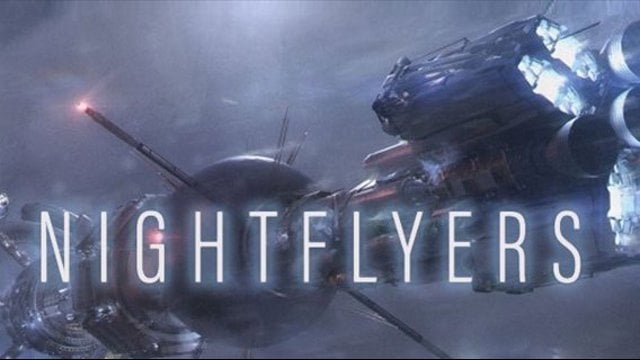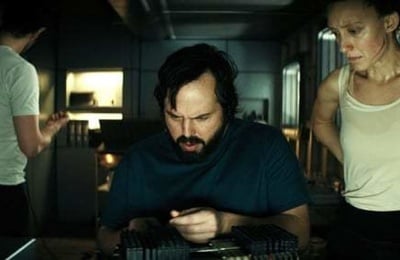
“When you torture yourself, Karl, it makes it easy for other people to do the same.”
As The X-Files so brilliantly phrased it, the truth is out there and now, in Nightflyers, the truth about what Karl’s team and Roy’s crew faces is no longer speculation. Cynthia Eris, as she lives and breathes, is imposing her will upon this section of space with a deadly focus, though her motivations remain a mystery. But for one episode, even her screams take a backseat to a much bigger discovery; the return of the White Rabbit probe.

Whereas Episode Three was high on the terror of the Nightflyer’s sentience coming to the forefront, “White Rabbit” throttles back a bit on that, focusing much of its time on the head-scratching return of the White Rabbit probe. The fact that it’s returned after being gone about a month is strange enough but to turn up in Karl’s quarters with no logical explanation is the episode’s true mystery.
Not only does it confirm the volcryn’s existence but may be the first steps towards bridging a more meaningful dialogue with them. To do that, Karl, Rowan, and Lommie will have to figure out the volcryn’s odd reply. Not only is the probe filled with data but it’s overflowing with biological matter matching Karl’s DNA. Coupled with the fact that, by Lommie’s estimation, the probe has been cruising through the void for more than a thousand years highlights not only the facts that these beings do not think like humans but they possess some form of control over space and time. It’s a daunting realization but doesn’t change Karl’s mission.
“White Rabbit” is primarily driven by the probe narrative with much of the character moments taking a back seat to further the story. It’s not a bad thing per se, except on a handful of occasions where things seemed rushed along. Roy and Mel’s scenes are especially hurried through, in part because of his mother’s interference but also the importance to keep things going. Karl and Agatha have similar moments crippled but it smoothed over a bit by a flashback from her memories. This also plays into one of the more terrifying things about the Nightflyer—aside from the homicidal presence trying to kill people, that is. Both Karl and Agatha have used the memory sphere to re-experience special moments in their lives and those memories are fodder for the Nightflyer to use against them. As of now, Karl has drawn the short straw and has been relentlessly taunted by the ship. Truthfully, it could be worse (as one of the crewmen discovered) but to have cherished memories brandished as a weapon against you is a terrible thought.

Though much of “White Rabbit” is plot-driven, the most pleasant of character moments revolve around Thale. Early on he was tagged as trouble, a sociopath who wished for nothing more than to torment the humans surrounding him but, with each episode, we’ve been given a greater understanding of him as a person as well as the curse that is his gift. When searching for the crewman Thale sensed die, Agatha tells Eris that “Thale experiences everything—mentally, emotionally, physically.” The thought of a person forced to experience every death or dark thought around them, unable to shut it out, is a terrifying prospect and those like Karl who, while not hating psychics, don’t want them around, would have a much different opinion were they to just stop for a moment and realize just how much they contribute to a telepath’s behavior.
Though the character pieces and some of the horror took a back seat in “White Rabbit”, the confirmation of the volcryn’s existence was an important step in building upon Nightflyers narrative. Lommie’s explanation of her port into the probe is brief and obscure, as she parses the data, we should get more information on Karl’s white whale. Whether or not it’ll be what he wants to hear or, worse, if the ship will even let them get that far, remains to be seen.
Into the Void
- The more we get to see Karl on screen, the more unlikeable he becomes. While he’s focused on a noble purpose, his selfishness shows up in nearly every conversation he has. It’s one thing to put his team members in danger for the mission but his inability to showcase any empathy or acknowledge the risks they’re taking for his goal shows the worst kind of leader. In that, it’s almost a relief when Rowan (correctly) boots him from the probe examination, pointing out that the appearance of Karl’s DNA in the probe prevents him from keeping that objective mind necessary.
- It’s only one episode but the anticipation of Mel and Roy’s first physical meeting was a letdown. There was no coherence to their interactions in this episode, almost as if the scenes were tacked on to remind us that they’re finally face-to-face…and that mother’s not happy about it. With more than half the season left to air, there’s plenty of time to rectify the stumbles with their relationship in this episode but by the way it was built up, if they swing and miss with these two, it will be a very disappointing outcome.
- Until “White Rabbit”, the connection Roy Eris has to the Nightflyer was the big question. Was it nothing more than a tacit understanding of it by his previous life with Cynthia or something more? There’s no more supposition after tonight’s fare as it’s shown that Roy and his mother share a psychic bond. Now whether that extended from while she was still alive or somehow has been able to tap into the ‘frequency’ of Roy’s mind is something to be answered down the road.
![]()
